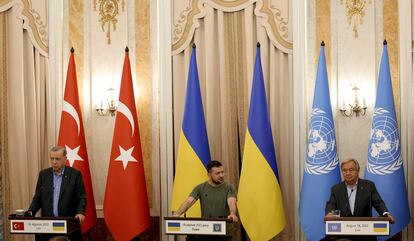Ukraine rules out peace negotiations until Russia withdraws from all occupied territories
Ukrainian President Volodymyr Zelenskiy called for the country’s territorial integrity to be respected, a point backed by Turkish leader Tayyip Erdoğan and UN Secretary General António Guterres


Ukraine will not open peace negotiations with Russia until all Russian soldiers have withdrawn from the country. This includes not only the territory that Moscow’s troops have conquered since the beginning of the invasion on February 24, but also the areas they have controlled since 2014, such as the Crimean peninsula and most of eastern Donbas. That’s according to Ukrainian President Volodymyr Zelenskiy, who appeared Thursday at a joint press conference with Turkish President Recep Tayyip Erdoğan and United Nations Secretary General, António Guterres. “Future negotiations can only take place when Russia withdraws from all Ukrainian territory,” Zelenskiy said.
The press conference followed their meeting in Ukraine’s western city of Lviv, near the border of Poland. Both Erdoğan and Guterres agreed on the need to defend Ukraine’s territorial integrity. “The main point of dialogue with the UN Secretary General is how to achieve the end of the war,” Erdoğan said. “We have to find the shortest and fastest way to get to the negotiating table,” he added. But Zelenskiy expressed reservations. “I stress that we have no confidence that Russia will honor its commitments,” he said.
In recent weeks, Ukraine has taken a firmer position on the need to protect its territory, stating that it is prepared to militarily expel Russian troops from the pro-Russian separatist areas of Donbas and Crimean peninsula, which was annexed in 2014 by Russia following a referendum that was not recognized by the international community.
The three leaders also agreed on the need for Russia to demilitarize the Zaporizhia nuclear power plant, where there have been clashes between Russian and Ukrainian soldiers. “We do not want another Chernobyl,” Erdoğan said, recalling the 1986 nuclear tragedy that occurred during the Soviet Union on Ukrainian soil. Guterres also expressed “enormous concern” about the fact that Russia has deployed troops, artillery and military vehicles inside the plant. “The area must be demilitarized, any other option would be suicidal,” he said. The UN Secretary General backed the International Atomic Energy Agency’s proposal (IAEA) to send a monitoring mission to Zaporizhia, which is the largest nuclear plant in Europe. He stressed that this mission would be acting under the orders of Ukraine.
Zelenskiy appeared tenser than his counterparts, he even corrected his English interpreter for omitting a part of his statement in which he recalled that Ukrainian civilians die every day under Russian bombs. The Lviv meeting was organized in record time: the event was announced just 24 hours before it took place. This led to organizational chaos, especially in the joint press conference. The meeting was held at Potocki Palace, the residence of Count Alfred Josef Potocki, a Polish nobleman and former prime minister of the Austro-Hungarian Empire. From the courtyard, boxes of humanitarian aid could be seen in the adjoining pavilions. Meanwhile, on the street, Ukrainian protesters demanded that Russia release the prisoners of war who were captured during the siege of Mariupol, a city that is now under Russian control of the Kremlin. Erdoğan said he will help get these fighters back to Ukraine.
This was Erdoğan’s first visit to Ukraine since the war broke out. During the joint press conference, the Turkish leader said his country defends “the territorial integrity and sovereignty of Ukraine.” “We are committed to diplomacy at the same time that we are at the side of our Ukrainian friends,” he added. The Turkish president saw Russian President Vladimir Putin on August 5. According to Russian and Turkish media, Putin was in favor of meeting Zelenskiy.
Erdoğan said that peace negotiations should build on the July pact between Russia, Ukraine, Turkey and the UN, which allowed Ukrainian grain exports to travel across the Black Sea. Guterres agreed: “The agreement on food exports demonstrates the success of diplomacy. This is just the beginning.” He warned, however, that “[diplomatic] initiatives in situations of war are inevitably fragile.” Following the meeting, Guterres was scheduled to visit the port of Odessa, from where most of the ships carrying Ukrainian grain have embarked from. The Russian fleet attacked the port of Odessa one day after the signing of the export agreement, breaching the July pact.
Guterres also announced that he has formed the UN team that will investigate the July bombing of more than 40 Ukrainian prisoners in Olenivka, a municipality in Donetsk province which is under Russian rule. Ukraine and Russia accuse each other of being behind the attack. Guterres said that the fact-finding mission is now ready, and only waiting for guarantees that it will be able to safely gather the necessary information.
Tu suscripción se está usando en otro dispositivo
¿Quieres añadir otro usuario a tu suscripción?
Si continúas leyendo en este dispositivo, no se podrá leer en el otro.
FlechaTu suscripción se está usando en otro dispositivo y solo puedes acceder a EL PAÍS desde un dispositivo a la vez.
Si quieres compartir tu cuenta, cambia tu suscripción a la modalidad Premium, así podrás añadir otro usuario. Cada uno accederá con su propia cuenta de email, lo que os permitirá personalizar vuestra experiencia en EL PAÍS.
¿Tienes una suscripción de empresa? Accede aquí para contratar más cuentas.
En el caso de no saber quién está usando tu cuenta, te recomendamos cambiar tu contraseña aquí.
Si decides continuar compartiendo tu cuenta, este mensaje se mostrará en tu dispositivo y en el de la otra persona que está usando tu cuenta de forma indefinida, afectando a tu experiencia de lectura. Puedes consultar aquí los términos y condiciones de la suscripción digital.








































